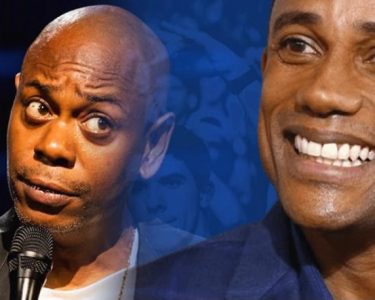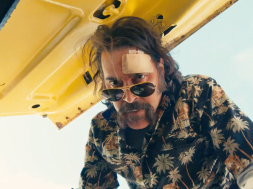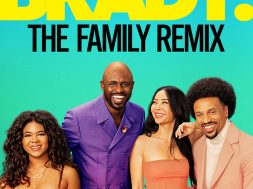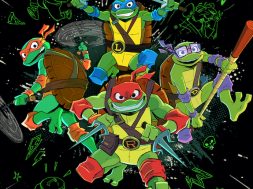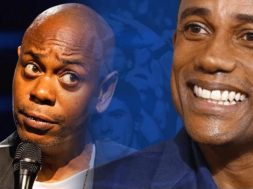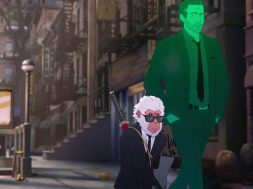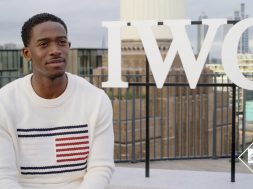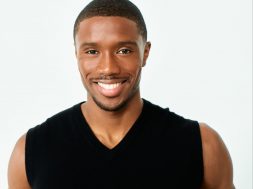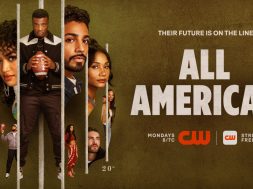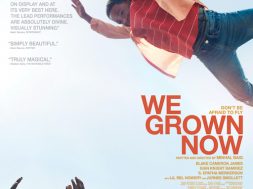IN ‘AMERICAN SKIN’ JUSTICE IS FINALLY ON TRIAL

AMERICAN SKIN releases January 15, 2021, on Digital Platforms
Reviewed by Thyronne Millaud-Director/Writer/Actor Nate Parker’s timely follow-up to his 2013 socially conscious THE BIRTH OF A NATION is the tense, timely thoughtful piece, AMERICA SKIN. Although both films are edgy instruments Parker uses to focus a magnifying glass on issues of racism and identity, which are exponentially important to him and millions of Americans, rather than dressing his criticism and exasperation in the guise of a historical drama, AMERICAN SKIN, tells a story so important and visceral that it could have been lifted from the evening paper six months ago, or yesterday, or, the way things are going maybe next week.
Parker plays Lincoln Jefferson, an ex-marine who after returning from multiple tours in Iraq and separating from his wife has taken a janitorial job at a school in an affluent neighborhood so he could enroll his 14-year-old but son Kajani (Tony Esperanza) in a better school than he would otherwise have an opportunity to attend. One night while driving home, Linc and Kajani are pulled over. Lincoln complies with every order the cop gives him and calmly announces every move he is about to make. When the cop tells him his insurance is expired, Lincoln tells him the card must be wrong and starts to move towards the glove box to retrieve the right card. Things begin to get tense as the police tell him to keep his hands where they can see them and get out of the car as they pull their guns. As Linc gets out his son grabs his phone and starts filming. The cop watching from the passenger side tells him to drop whatever is in his hands and keep his hands up as he moves to open the door. With both cops yelling orders and Lincoln telling his son to put the phone down and listen to the cops, things escalate and Kajani ends up getting shot.
The story then jumps a year where we meet Jordin King (Shane Paul McGhie), a middle-class black student working on his thesis, a documentary following Lincoln in the aftermath of the shooting and the approaching grand jury, where Lincoln, and everyone, really, is expecting indictments of the policemen responsible for Kajani’s death. When there are no indictments and the police are allowed to go back to work, riots break out, complete with fires and looting.
The city sends Captain Morris (Wolfgang Bodison) to convince Kijani’s mother, Tayana (Milauna Jackson) to go on tv and plead for peace. Lincoln asks Jordin and his crew to come with him as he’s going down to the courthouse to file some papers, instead, he goes and kidnaps Captain Morris at gunpoint then meets up with some of his family members and ex-military friend Omar ‘Derwood’ Scott(Omari Hardwick), all strapping on bulletproof vests and loading up assault rifles. They proceed to storm the police station where Officer Randall (Beau Knapp) the cop who shot his son and his partner Officer Reyes is working the desks. After a few gunshots are exchanged Linc gets the cops to put down their weapons and allow themselves to be taken hostage with a handful of civilian employees and people who just happened to be at the station.
While a SWAT team is assembled outside, Linc’s men bring in prisoners all in orange prison jumpsuits. He explains that these are nonviolent offenders who along with the civilian hostages are going to be on the jury sitting in judgment of Officer Randall. Amidst violent objections from the officers, Lincoln is determined that both he and his son’s killer are going to get justice his way. And if the unjust, racist society would never deliver it would be up to him to make the guilty accountable for their actions.

This is the setup for the actual story, which is part DOG DAY AFTERNOON and part 12 ANGRY MEN squeezed into the constricts of a found-footage mock documentary format. The rest of the film is pretty much a courtroom drama with Lincoln as the prosecutor and Randall’s partner Officer Reyes (Theo Rossi) defending him while various jurors asking questions and offering commentary from their unique perspective and life experience. To me, the trial sequence seemed somewhat preachy with a parade of two-dimensional characters repeating the same bullet points we always hear when debates about police shootings do occur. To be fair to the filmmakers there just wasn’t the time available to flesh out these characters and present both sides of the argument.

Parker does try to give both sides equal weight. The prisoners accusing the police of brutality and profiling, the police talking about having citizens wanting to be protected, and what they have to do to provide this protection. When the characters argue their point of view, the viewer gets some insight into where they’re coming from. But these arguments don’t really sway anyone, when the jurors take a vote on Randall’s guilt, it’s split as one would expect, the prisoners vote guilty, the mostly white citizens vote innocent.
It takes a while for Lincoln to get Randall to admit in a Jack Nicholson, “you can’t handle the truth!” Moment, that they did indeed ‘profile’ Lincoln and Kijani that night. Ultimately there’s not much drama or suspense that a jury being held at gunpoint by heavily armed men led by the father of a dead son would find the man who killed the boy guilty, but there is a surprise along with some tense dramatic scenes in how Lincoln carries out the sentence. I’m still to sure how I feel about the shock ending that I saw coming the second it was clear Lincoln was going to take over the police station.
It’s obvious Parker is a dedicated and impassioned social justice warrior, these are issues that are at his very core, and this film is a plea for society to have this much-needed conversation. True conversations require both participants to not only speak their mind but to listen to what the other is saying and actually hear what is being said. I feel AMERICAN SKIN does a much better job of this when it’s showing us rather than telling us. The traffic stop and shooting scene is an amazing piece of filmmaking. It’s incredibly tense and emotional. The dialog, the acting, everything is so on point. It’s so visceral you can feel Lincoln’s fear and after the shock of the senseless shooting, the viewer is left stunned and angry.
Once the film crew appears and Lincoln starts telling his story, we really get some insight into Lincoln’s character. We learn how he served in the middle east and how patriotic he was, buying into the idea that he was doing it for America. We see how disillusioned he is when he returns to a failed marriage and an America that not only doesn’t appreciate his service but doesn’t even afford him the respect as a human being. Parker is a such charismatic and sympathetic onscreen presence that his humanity and grief are infectious. He explains that he took a job as a janitor so he could enroll Kijani in a better school district. Through flashbacks, we also learn about who Kijani was. He was raised to be strong, to respect, and stand up for himself. Proud like his father.
But unlike Lincoln who grew up attended school in a black neighborhood, Kijani is being taught what the white students are taught, particularly when it comes to the law and as American citizens how to deal with the police. There’s a scene when Linc walks in on Kijani chatting online with a black friend. He hears Kijani telling his friend how it is legal to not only resist but to fight back in the case of a false arrest. In a touching and powerful scene, Linc explains to the boys that even though that is technically what the law says, it’s not the same for black people and it’s better to comply and make it home alive.
I have heard this referred to as the ‘talk’, the conversation every black parent has with their child. Something, I, never heard from my parents. As a child, I heard stories of my father’s brother who’s shot dead by police. As a rather large 13 year old I was stopped and beaten by police in Long Beach after they thought I looked like someone they were looking for. Even after this I never feared the police. I remember not understanding why my black friends who were in my car would get so nervous if we’d get pulled over. Something I always thought of as an inconvenience seemed like so much more to them. Watching scenes like the one where Linc talks to his son and his friend after watching the traffic stop scene stamps a far deeper exclamation point as to why people have the fear and distrust against the police they do. I remember the visceral reaction I had after seeing FRUITVALE STATION, I had those feelings through the first half of AMERICAN SKIN.
Ultimately, AMERICAN SKIN may not light it up come awards season but it is a very watchable film with some great acting that has something to say. It may not change any minds but if it gets one person to question and engage in a serious conversation then it’s succeeding. AMERICAN SKIN is an important film. A film worth watching so we can feel the shadow of fear that hangs on the shoulder of so many in today’s society.
AMERICAN SKIN Stars Nate Parker, Omari Hardwick, Beau Knapp, Theo Rossi, Shane Paul McGhie, Milauna Jackson, AnnaLynne McCord, Vanessa Bell Calloway.
DIRECTOR’S STATEMENT
In 2014, following the death of Michael Brown, I traveled to Ferguson, Missouri to gain a better understanding of the tensions between law enforcement and young men and women of color. The most tragic moment of this trip arrived when I stood downtown between two infuriated groups of citizens. From one side came yells of ‘Justice for Mike Brown’ and on the other ‘Support Our Police’. It became clear to me, instantly, the disconnect in our understanding of citizenship, law enforcement, and our responsibility to preserve American life. As an American citizen, father, brother, son, and artist, I felt compelled to use my platform as a filmmaker to respond to this crisis in a way that could not only promote social equity but initiate a global culture shift that can result in the preservation of lives. If saving one life is the only thing this film achieves, it will have served its core purpose.



